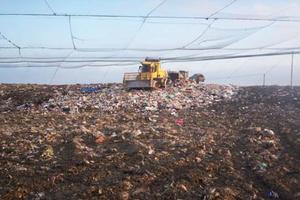
SITA UK has lodged a planning application to keep its Hill of Traumaud landfill site, north of Aberdeen, open until June 2011, writes Peter Connolly.
SITA has applied to Aberdeen city council to extend landfilling at the Hill of Traumaud site until June 2011 And, the company has also announced that the 70 million extension to its existing Tees Valley energy from waste facility, which it plans to use to process residual waste under its PFI deal with Northumberland county council, has passed performance tests.
In Aberdeen, SITA has applied to the city council to continue landfilling at the Hill of Traumaud site for another 18 months past its planned closure date at the end of this year due to concerns over its long term maintenance and drainage if it closes as planned.
The company stressed that it had no plans to extend the size of the site or increase the amount of waste buried but had lodged the application due to predictions that there would be a shortfall of about 120,000 tonnes in waste if it closed as planned in December 2009, which would impact on the site's future appearance.
Explaining the effects of the current planned closure, and the wastage shortfall, the company's planning manager, Annemarie Wilshaw, said: "We predict that if tipping were to cease by the end of this year, there would be a shortfall of about 120,000 tonnes, which would result in a less than ideal final landform, with potential surface water drainage and other long-term maintenance issues."
The Hill of Traumaud landfill site was originally closed by its then operators, Aberdeen city council, in 1999, but SITA UK was previously given permission to re-open it in December 2004 for a five year span to fill the remaining void and restore the land.
However, subsequent delays in planning postponed the re-opening until May 2006, prompting this new application.
The company says that if the application is approved by Aberdeen city council, it would have valuable extra time to completely fill the void.
Tees Valley
Meanwhile, SITA has revealed "stringent" performance trials that have been carried out on a £70 million, 136,000 tonne-a-year capacity extension to its Tees Valley energy-from-waste facility, near Billingham, have been passed "with flying colours" and the development has been passed over by its contractors to the SITA to run it on a day-to-day basis.
The extension has been built on behalf of Northumberland County Council, to process residual waste provided under its 28-year, PFI funded waste treatment contract with SITA UK, which was signed in December 2006 (see letsrecycle.com story).
Under the deal, SITA will handle around 110,000 tonnes of waste a year at the Tees Valley energy-from-waste facility, rising to 130,000 tonnes in later years.
The vacant space in the extension, around 20-25,000 tonnes a year, will be made available to other councils and customers for waste, to allow them to divert waste from landfill.
The additional waste alone will produce around 10MW of electricity, supplying the energy needed for 12,000 homes, bringing the total power produced by the facility - which now has a total capacity of 390,000 tonnes-a-year - to 30MW, to be fed into the National Grid.
Richard Hinchcliffe, SITA UK's general manager for the Northumberland PFI contract, said: "This major new facility will ensure SITA UK is able to achieve its commitments to Northumberland and the rest of the north east. I am really pleased that one of the Tees Valley's largest construction projects and the testing of some extremely complex equipment has been commissioned without a hitch and exceeded all expectations.
"As Northumberland County Council's partner we are committed to major investment in state-of-the-art new facilities that can help achieve ambitious landfill diversion targets that have been set under our contract.
"The extension at the energy-from-waste facility has been designed to the very highest environmentally friendly standards - far higher than the toughest European requirements," he added.
Councillor Alan Thompson, Northumberland county council's Executive Member of the Environment said: "The ultimate aim is to reduce the county's long-term reliance on landfill, so that just 8% of the county's waste goes to landfill by 2012."